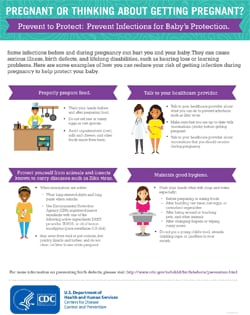Prevent Infections for Baby’s Protection

Some infections before and during pregnancy can hurt both you and your baby. Learn how to protect yourself from animals and insects known to carry diseases, such as Zika virus.
Some infections before and during pregnancy can cause serious illness, birth defects, and lifelong disabilities, such as hearing loss or learning problems. Women can lower their risk of having a baby born with a birth defect by following some basic health guidelines throughout their reproductive years. This is important because many birth defects happen very early during pregnancy, sometimes before a woman even knows that she is pregnant. We encourage all women and their loved ones to Prevent to Protect: Prevent infections for baby’s protection.
How to Protect Yourself from Animals and Insects Known to Carry Diseases
- Use insect repellents: Mosquitoes spread many types of viruses that can cause diseases such as Zika. To protect yourself, use Environmental Protection Agency (EPA) registered insect repellents on your skin that contain one of the following active ingredients: DEET, picaridin, IR3535, or oil of lemon eucalyptus.
- Wear long-sleeved shirts and long pants when outside: When possible, wear long sleeves and pants for additional protection against bug bites. Mosquitoes may bite through thin clothing, so treat clothes with permethrin or another EPA registered insecticide for extra protection.
- Stay away from wild or pet rodents and their droppings: Have a pest control professional get rid of pests in or around your home. If you have a pet rodent, like a hamster or guinea pig, have someone else care for it until after your baby arrives. Some rodents might carry a harmful virus. Learn more about lymphocytic choriomeningitis virus (LCMV).
- Do not clean cat litter boxes while pregnant: Cats can spread toxoplasmosis, a parasite that can pass to your developing baby. Avoid changing cat litter while pregnant. If no one else can perform the task, wear disposable gloves and wash your hands afterwards with soap and water.
CDC Activities: Birth Defects
CDC works to identify the causes of birth defects, find opportunities to prevent them, and improve the health of those living with birth defects.
- Tracking: CDC is tracking the spread of Zika virus and studying the links between Zika and birth defects. In addition, CDC funds 14 states to track major birth defects. State systems use the data to help guide birth defects prevention activities and refer children affected by birth defects to needed services.
- Research: CDC funds the Centers for Birth Defects Research and Prevention, which collaborate on large studies such as the National Birth Defects Prevention Study (births 1997-2011) and the Birth Defects Study To Evaluate Pregnancy exposureS, also called BD-STEPS, (began in 2014). Researchers on these studies work to identify things that may increase or decrease the risk of having a baby with a birth defect. Other CDC research focuses on health services use and long-term health outcomes for people who have birth defects, and the costs of birth defects.
- Prevention: CDC and its partners use what they learn through research to help prevent birth defects.
- Folic acid: Getting enough folic acid (a B vitamin) before and during the early weeks of pregnancy greatly reduces the risk of serious birth defects of the brain and spine known as spina bifida and anencephaly . A 1996 policy to add folic acid to many foods helps to prevent many of these birth defects.
- Preconception care: CDC and its partners also work to educate women about the importance of preconception (before pregnancy) health through a campaign called Show Your Love.
- Improving the lives of individuals with birth defects: Babies who have birth defects often need special care and treatment to survive and thrive. Birth defects tracking systems provide one way to identify and refer children for services they need as early as possible. Early intervention (treatment for delays in physical and mental development, and in speech/language) is vital to help babies born with a birth defect reach their full potential.



































No hay comentarios:
Publicar un comentario